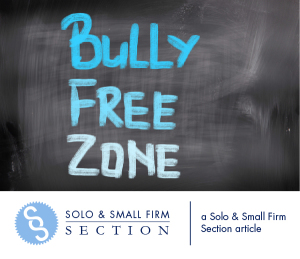 Small and solo law firm attorneys should expect to hear more about workplace bullying.
Small and solo law firm attorneys should expect to hear more about workplace bullying.
As of January 1, 2015, mandatory anti-harassment training by employers must contain an anti-bullying component. Covered employers must provide supervisory employees with training about prevention of abusive conduct, in addition to the two hours of sexual harassment training every two years that the law already requires. However, the new law does not give an employee a cause of action against an employer that fails to provide training, and there remains no state law against bullying specifically.
What is “abusive conduct?”
The new law defines “abusive conduct” to include conduct of an employer or employee in the workplace, with malice, that a reasonable person would find hostile, offensive, and unrelated to the employer’s legitimate business interests. Abusive conduct may include repeated verbal abuse, such as derogatory remarks, insults and epithets; threatening, intimidating or humiliating physical conduct; or the gratuitous sabotage or undermining of a person’s work performance. A single act does not constitute abusive conduct, unless especially severe and egregious.
Why the new law is helpful
By defining abusive conduct, the new law gives lawyers a context for explaining it, helping their clients to identify and prevent it. Providing training and education to supervisors raises awareness of bullying and is consistent with internal policies many employers already have in place but may not routinely enforce. While the legislation does not apply currently to smaller companies, that may change in the future as some consider bullying to be a growing problem. Also, bullying often relates to harassment, for which an employer of any size may be liable. For these reasons, solo and small firm attorneys who advise smaller companies may see an increase in complaints about bullying. The new law also adds a minor deterrent, since an employer who fails to provide training may be subject to a compliance order from the Fair Employment and Housing Commission.
Why the law doesn’t go far enough
The law now applies only to employers with 50 or more employees, whereas bullying occurs in companies of any size. An employer that fails to provide training and education may not be subject to civil liability by a harmed employee, and firing an employee for reporting the employer’s noncompliance may be perfectly legal. “Abusive conduct” by itself is not unlawful, unless it relates to an employee’s protected status like gender, race, or national origin. This means that an employee who is fired or quits due to bullying may have little recourse, except to argue her claim within the framework of other employment laws. Solo and small firm attorneys who represent employees should consider trying to prove that abusive conduct shows discrimination, violates the employer’s internal policy, or is an actionable tort, until the legislature makes abusive conduct, by itself, unlawful.
About the author:
Aaron Minnis, a partner at Minnis & Smallets, has been practicing law in California since 1999. He advises executives, professionals, attorneys, and employees through complex and sensitive work issues. He serves on the Executive Committee for BASF’s Solo and Small Firm Section and on the Practice Management Committee for the California Employment Lawyers Association.


